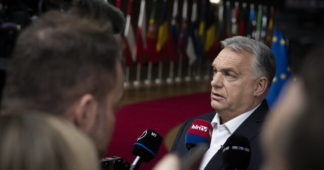By Nette Nöstlinge
Mar 31, 2025
The time has come to punish Orbán, Germany’s next government says
Friedrich Merz’s incoming coalition wants to press the EU to look at withholding funds and suspending voting rights from Hungary, according to a document seen by POLITICO.
The German vote
More broadly, the coalition negotiators vowed to take on a more proactive role on the European stage by using the Weimar Triangle — a loose alliance of France, Germany and Poland — as a vehicle for shaping EU policy. Under the previous coalition government led by the SPD’s Olaf Scholz, Germany’ relationship with France and Poland deteriorated.
“In the Weimar Triangle, we will seek close coordination on all relevant European policy issues in order to act more united in the service of the EU as a whole,” reads the draft agreement, echoing previous statements made by incoming chancellor Merz, who has said he will travel to both Paris and Warsaw on his first day in office.
Conservatives also vowed to address one complaint about Germany frequently heard in European capitals: Germany’s abstention in votes on important EU issues, ironically referred to as the “German vote.”
When German ministries are themselves at odds over EU policy, the country, as a rule, abstains from EU votes. Merz, however, has vowed there would be no such German abstentions when it comes to key votes in Brussels under his leadership.
But his conservatives and the SPD disagree on how to make that happen. The conservatives want Merz to be able to have a bigger say in Germany’s position when it comes to EU votes of major importance by “taking responsibility for coordination from the outset or taking charge of it during the procedure.” The SPD, on the other hand, wants to adhere to “the interministerial principle,” resolving disputes between ministries.
The draft agreement on the government’s positions on the EU comes from one of the 16 cross-party working groups established to develop positions on key policy areas. On Friday afternoon, key politicians entered final negotiations to stitch together a unified coalition agreement based on the working groups’ drafts.
A final coalition agreement may come as early as mid-April.
We remind our readers that publication of articles on our site does not mean that we agree with what is written. Our policy is to publish anything which we consider of interest, so as to assist our readers in forming their opinions. Sometimes we even publish articles with which we totally disagree, since we believe it is important for our readers to be informed on as wide a spectrum of views as possible.











